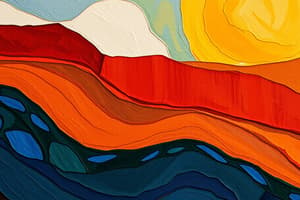Podcast
Questions and Answers
What is the thickness range of the Earth's crust under mountains?
What is the thickness range of the Earth's crust under mountains?
- 0 to 32 kilometers
- 5 to 10 kilometers
- 32 to 72 kilometers (correct)
- 50 to 100 kilometers
Which element is the most abundant in the Earth's crust?
Which element is the most abundant in the Earth's crust?
- Silicon
- Aluminum
- Oxygen (correct)
- Iron
What percentage of the Earth's total volume does the mantle constitute?
What percentage of the Earth's total volume does the mantle constitute?
- 40%
- 90%
- 60%
- 80% (correct)
What separates the crust from the mantle?
What separates the crust from the mantle?
Which element becomes more abundant in the lower mantle compared to the upper mantle?
Which element becomes more abundant in the lower mantle compared to the upper mantle?
What is the thickness of the lithosphere?
What is the thickness of the lithosphere?
Which discontinuity separates the mantle from the outer core?
Which discontinuity separates the mantle from the outer core?
What is the primary characteristic of the mantle?
What is the primary characteristic of the mantle?
What is the main element found in the Earth's crust?
What is the main element found in the Earth's crust?
Which layer of the Earth makes up approximately 80% of its total volume?
Which layer of the Earth makes up approximately 80% of its total volume?
What primarily distinguishes the upper mantle from the lower mantle?
What primarily distinguishes the upper mantle from the lower mantle?
What is the general depth range of the crust below the Earth's surface?
What is the general depth range of the crust below the Earth's surface?
Which discontinuity is responsible for separating the crust from the mantle?
Which discontinuity is responsible for separating the crust from the mantle?
In terms of composition, what elements dominate the mantle?
In terms of composition, what elements dominate the mantle?
What percentage of the Earth's total mass does the mantle account for?
What percentage of the Earth's total mass does the mantle account for?
What structural feature of the Earth is the lithosphere primarily made of?
What structural feature of the Earth is the lithosphere primarily made of?
Flashcards are hidden until you start studying
Study Notes
Layers of the Earth
- The Earth is composed of three main layers: crust, mantle, and core.
Crust
- The crust is the thinnest and outermost layer, reaching depths of about 32 kilometers; it can thicken up to 72 kilometers beneath mountain ranges.
- The Mohorovicic Discontinuity (Moho) marks the boundary between the crust and the mantle.
- Major elements in the Earth's crust include:
- Oxygen: 46.60%
- Silicon: 27.72%
- Aluminum: 8.13%
- Iron: 5.00%
- Calcium: 3.63%
- Sodium: 2.83%
- Potassium: 2.59%
- Magnesium: 2.09%
- Titanium: 0.40%
- Hydrogen: 0.14%
Mantle
- The mantle extends approximately 2,900 kilometers from the Earth's surface and constitutes about 80% of the Earth's total volume and 68% of its mass.
- The mantle is predominantly solid and consists mainly of silicon, oxygen, iron, and magnesium.
- The uppermost portion of the mantle, along with the crust, forms the lithosphere, which ranges from 50 to 100 kilometers in thickness.
- The Gutenberg Discontinuity separates the mantle from the outer core.
- The lower mantle contains a higher concentration of iron compared to the upper mantle, resulting in increased density in the lower layer.
Layers of the Earth
- The Earth is composed of three main layers: crust, mantle, and core.
Crust
- The crust is the thinnest and outermost layer, reaching depths of about 32 kilometers; it can thicken up to 72 kilometers beneath mountain ranges.
- The Mohorovicic Discontinuity (Moho) marks the boundary between the crust and the mantle.
- Major elements in the Earth's crust include:
- Oxygen: 46.60%
- Silicon: 27.72%
- Aluminum: 8.13%
- Iron: 5.00%
- Calcium: 3.63%
- Sodium: 2.83%
- Potassium: 2.59%
- Magnesium: 2.09%
- Titanium: 0.40%
- Hydrogen: 0.14%
Mantle
- The mantle extends approximately 2,900 kilometers from the Earth's surface and constitutes about 80% of the Earth's total volume and 68% of its mass.
- The mantle is predominantly solid and consists mainly of silicon, oxygen, iron, and magnesium.
- The uppermost portion of the mantle, along with the crust, forms the lithosphere, which ranges from 50 to 100 kilometers in thickness.
- The Gutenberg Discontinuity separates the mantle from the outer core.
- The lower mantle contains a higher concentration of iron compared to the upper mantle, resulting in increased density in the lower layer.
Studying That Suits You
Use AI to generate personalized quizzes and flashcards to suit your learning preferences.




